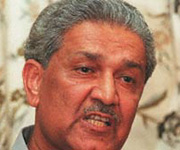 Abdul
Qadeer Khan, who has confessed to transferring nuclear technology
to Iran and Libya, is regarded as a national hero for helping Pakistan
become a nuclear state. Abdul
Qadeer Khan, who has confessed to transferring nuclear technology
to Iran and Libya, is regarded as a national hero for helping Pakistan
become a nuclear state.
Dr Khan played the key role in developing Pakistan's nuclear military
capability, which culminated in successful
tests in May 1998.
Coming shortly after similar tests by India, Dr Khan's work helped
seal Pakistan's place as the world's seventh nuclear power and sparked
national jubilation.
In March 2001 he was promoted to the inner circle of the country's
military leadership as special science and technology adviser to
President Pervez Musharraf.
He was sacked from the position unceremoniously
in January 2004 during the investigation.
But revelations that he has passed on nuclear secrets to other
countries have shocked and traumatised
Pakistan.
In a televised address, Mr Khan offered his "deepest regrets
and unqualified apologies".
"I take full responsibility for my actions and seek your pardon,"
he said.
Abdul Qadeer Khan was born into a modest family in Bhopal, India,
in 1935.
He migrated to Pakistan in 1952, following the country's partition
from India five years earlier.
He graduated from the University of Karachi before moving to Europe
for further studies in West Germany and Belgium.
In the 1970s, he took a job at a uranium enrichment plant run by
the British-Dutch-German consortium Urenco.
But in 1976, Dr Khan returned home to head up the nation's nuclear
programme with the support of then prime minister Zulfikar Ali Bhutto.
During his work, Dr Khan insisted that the programme had no military
purpose, but following the 1998 tests admitted: "I never had
any doubts I was building a bomb. We had to do it."
He went on to work on the successful test-firings of the nuclear-capable
Ghauri I and II missiles.
As he was carrying out his programme, Dr Khan was also being investigated
in the Netherlands for taking enrichment technology during his time
in the country.
In 1983, he was sentenced in absentia to four years in prison by
an Amsterdam court for attempted espionage,
although the sentence was later overturned on appeal.
Dr Khan's facility, Khan Research Laboratories at Kahuta, became
Pakistan's main nuclear weapons laboratory where uranium was enriched.
It has continued to attract US suspicion and in 2003 Washington
imposed sanctions on the firm for the alleged transfer of missile
technology from North Korea.
In later years, Dr Khan has launched a campaign against illiteracy
and built educational institutes in Mianwali and Karachi.
|
